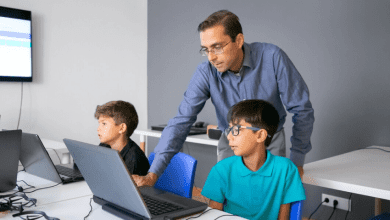Can Online Learning Replace Traditional Education?
Online Learning vs Traditional Learning

Is Online Learning a good replacement for traditional education?
What is the difference between online learning and traditional learning? What is the best way to learn? There are both good and bad things about both traditional and modern methods.
Online Learning vs Traditional Learning
COVID has changed the way we live now, and that isn’t news. Whether it’s business, entertainment, hospitality, or education, the lethal virus has caused major changes in almost every part of our lives. We’re still trying to figure out how to deal with the effects of these big changes. Online learning is just one among all of those we talk about nowadays.
What we’re also debating is how long these changes will last, and what the new normal in each of these sectors will be. This is also something we’re talking about.
Can online teaching be used instead of classroom teaching? – The COVID-19 case
Education, for example, is one thing. Soon after it became clear that this wasn’t just a short-term virus, educational institutions started to move more and more of their classes online. Students and professors quickly learned how to teach, learn, and get a grade.
This success, however, has led to a lot of people saying that the pandemic has caused a big change in higher education, with many saying that the future of college education is online.
The truth is that the future isn’t as black and white as it used to be. There’s a lot of gray in the middle. This is the kind of learning we seem to be moving toward a mix of online and offline. If you want to learn on your own time, there will be a lot of options for you to choose from online. In-campus teaching will come back, but not as soon as we’d like.
But, which one will be more important? Not at all, because both have their own unique qualities that make them worth having in the first place. People will learn how to use them together.
For college education, the truth is that online learning can never be as good as having a real-life class at the school.
🙂 Here’s why:
-
This isn’t quite the same as virtual campus life, but it’s close enough.
The whole experience of living on a college campus, meeting people from all over the world, and having passionate debates late into the night over a lot of tea are all important parts of university. It’s about being sociable and adaptable, and it’s about learning how to live on your own in a new culture, city, or country.
You learn how to be on your own when you leave the comfort of your own home. Online college, on the other hand, doesn’t teach you these important skills.
-
Online learning and traditional learning have different experiences for each student.
Living experiences are important, but in-class learning is also important. When you ask a question in class, for example, it gives you a sense of confidence. Instead of typing in anonymous questions, you can debate and talk about ideas right away instead.
Talking with a friend over dinner about a point you made in class when you’re not at school takes away the chance to do that. It takes away the chance for students to come together, talk, and build friendships with one another. Making friends online isn’t the same as making real-life friendships and learning about different people, situations, and cultures.
Digital learning also takes away another important part of college life: the chance to find new interests and learn new skills by joining clubs and societies. Students who stay at home can’t go to events like performances, competitions, fairs, and mixers that let them try new things and grow as people.
-
Online: You can log in from anywhere. Learn everything. But, it’s not that easy. It’s not that simple.
It’s true that online learning has changed the world of education. Platforms like Coursera and EdX have made it possible for people in remote parts of the world to take university courses. But, it must also be known that online learning is a very high-class thing to do.
People who want to learn something well need to have the tools and resources to do so. They need a working laptop, high speed and stable internet, and a quiet place to study for 90 minutes at a time without interruption or distraction.
These requirements are both very discriminatory and very exclusive. If you can’t afford a good Wi-Fi connection or live in a place where you can’t get a private, quiet place for yourself, online learning can be difficult.
Only people who live in the right places can truly enjoy online classes.
-
One of the best levelers
There are also social constraints that students from all over the world may have to deal with, not just when it comes to money. For many students, going to school is a way to get away from emotional triggers and other mental health problems at home, as well as problems in their family.
Another problem with students going home is that they might be in a bad learning environment. Even people who don’t have an underlying condition say that it’s hard to focus on academic reading and tasks when they’re home because they’re often asked to do chores and given other responsibilities.
A college campus is very important because it helps students learn. It should be a place where students can focus and learn. People who go to school the old-fashioned way have access to the same things like Wi-Fi connections, study spaces, books and libraries, and even one-on-one interactions with professors and counseling centers.
In this way, social and financial disadvantages become a lot less noticeable. This is a big deal when you think about the future of education.
-
Zooming in on a film class isn’t quite the same as taking the class in person.
Theoretical subjects may be easy to adapt to online learning, but there are a lot of different disciplines and fields that students want to get better at. Online learning takes away important resources, like labs and studios, that can’t be made at home. These resources are important for some subjects and can’t be made at home.
The switch to online learning is taking away more than it can give to people who study things like theater, film, music, dance, and so on. Another benefit of being on campus is that classes can go on field trips in the area where they study, allowing them to see how the subjects they are learning are used in the real world. In the same way, online classes can’t do this, either.
Is online learning going to replace classroom teaching? – this is the summary.
While it’s great that the education sector has changed quickly to the pandemic, there are still some problems with online education (especially for universities), even if you don’t live in an area where you can go to school.
It can be discriminatory, and it runs the risk of promoting the idea that university is only for academics. The future of education, then, should be a good mix of online and offline classes, with the online classes being extra to the offline ones.
And campus life must stay the same.






